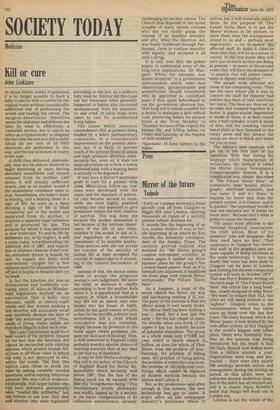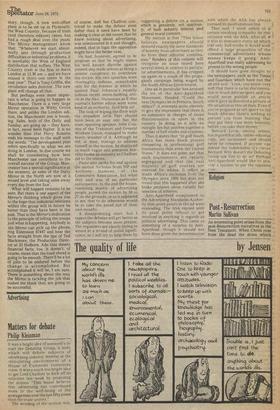Press
Mirror of the future
Tadpole
"Early on I uesday morning a Dove aircraft took off from Glasgow to Biggin Hill, near London, carrying thousands of copies of a secretly printed tabloid destined for . . . ." It sounds like the beginning of an Eric Ambler thriller, It was, in fact, the beginning of an article by Eric Jacobs, the industrial correspondent of the Sunday Times. The secretly printed tabloid was destined for "the Mirror group's London newspaper workers. In twelve pages it spelled out development plans for the group's five London-based papers. And, as if to forestall any argument, it headlinedl the front page with typical Mirror enthusiasm: The Future Starts Here".
As it happens, a copy of the secret tabloid has blown my way and fascinating reading it is, too. The point of the exercise is that the Mirror group is very nearly broke. The Mirror itself has been making a loss — small, but a loss just the same — for the last couple of years. No wonder when you think of the copies it has lost recently because of industrial disruption. The group as a whole made only E75,000 last year, which is clearly absurd. It suffers, as does the whole of Fleet Street, from the problem of overmanning, the problem of falling sales, the problem of rising prices, the problem of restrictive practices, the problem of old-fashioned technology which cannot be replaced by modern methods because the unions won't allow it.
But, as my predecessor said often enough in this column, the new technology has got to come. It won't solve all the newspaper industry's problems when it arrives, but it will massively reduce them. So the purpose of 'The Future Starts Here' is to put the Mirror workers in the picture, to show them what the management intend to do and — perhaps most importantly — to re-assure the affected staff, to make it clear to them that they will be re-trained or retired. In the first event they will earn just as much as they are doing at present — or more: in the second event they will have the prospect of "a pension that will permit retirement in dignity and comfort."
The people most affected are those in the composing room. They are the ones whose job it was to convert the stuff the reporter had written into lines of type, cast from hot metal. The lines are then set up in order and clamped together in a frame. A papier-mache impression is made of them, it is bent round into a half-cylinder, a cast is made of that, and the resulting curved metal plate is then fastened to the rotary press and hey presto! the words are there in black and white for you to read.
The Mirror's new methods will get rid of the first part of the operation. With that feeling for language which characterises all technicians, the method is called the Mirror Group Newspapers Computographic System. It is a complicated mix, simply described in 'The Future Starts Here', of computers, laser beams, photography, electronic scanners, and you name it and it's there. It requires far fewer men than the present system, it is cleaner, and it is quicker. The important words in that last sentence are "it needs far fewer men". Because that's what is going to cause the trouble.
The union most affected is the National Graphical Association, the craft union. Most of its members' jobs will disappear. But they need have no fear: "Our experience in Glasgow has shown that staff in the graphics area are quite capable of being retrained in the news technology. I have no doubt that what has been done in Glasgow can be done in London and training for the new composing system will start in October 1975". That was Percy Roberts, writing on the back page of 'The Future Starts Here'. His article has a long headline, clearly designed to allay fears: "We want to ensure that ALL our titles are still being printed in the 'eighties". Glasgow refers to the transformation which has taken place up there over the last few years. The Daily Record, which is a Mirror paper, is now printed by the web-offset system; in fact Glasgow is the world's biggest web offset plant. There were inevitably troubles as the process was being introduced, but the result is that the Daily Record now makes more than a million pounds a year. Negotiations were long and protracted — there were very nearly 200 meetings between unions and management during the setting-up period, so that ulcers were not unknown around Anderston Quay. But in the end it has all worked out, and it is clearly Percy Roberts's belief that things will work out in London too.
London is not the whole of the story, though. A new web-offset plant is to be set up in Plymouth; the West Country, because of train (and therefore edition) times, has had a rough deal over the years. The Mirror management know that: "Whenever we start abnormally late through production difficulties or industrial problems, it is inevitably the West of England distribution that suffers. The West Country train is the first to leave London at 12.30 am — and we have missed it thirty-one times in the past year". That is Tony Griffin, the circulation sales director. The new plant will change all that.
But perhaps even more important is what is going to happen in Manchester. There is a very large Mirror operation in Withy Grove there, and unlike the London edition, the Manchester one is booming. Sales, both of the Daily and Sunday, are going up — they have, in fact, never been higher. It is no wonder then that Percy Roberts ends his message to the staff with the words: "The development plan refers specifically to what we are doing in London. In due course we shall be considering how best Manchester can contribute to the overall success of the Group. Manchester has a special significance at the moment, as sales of the Daily Mirror in the North are now at a record level and taking sales away every day from the Sun'.
What will happen remains to be seen. But there is one aspect of the Mirror's thinking which gives rise to the hope that industrial relations within the group will in future be better than they have been in the past. That is the Mirror's dedication to the principle of telling the troops just what is happening. Anybody in the Mirror can pick up the phone, ring Extension 47447 and hear the facts straight from the lips of Ted Blackmore, the Production Director at 33 Holborn. Adn that means financial facts, too. It doesn't, of course, mean that the road ahead is going to be smooth. There'll be a lot of jolts to be endured before the change is accomplished. But accomplished it will be, I am sure. There is something about the way • the Mirror is tackling the job that makes me think'they are going to be successful. of course, daft but Chalfont contrived to make the debate even dafter than it need have been by making it clear at the outset that he knew nothing about advertising, was uninterested in it and thought, indeed, that in logic the opposition might have the better case.
He had, however, agreed to be proposer so that he might repeat his well known diatribe against present-day trade unions as being a sinister conspiracy to overthrow the nation. His two speeches were thoroughly tedious, remarkable only for the manner in which he quoted Paul Johnson's , equally tedious recent union-bashing article in the New Statesman as if that journal's former editor were some kind of an authority, God help us!
The task of wiping the floor with the impudent little Peer should have been an easy one, but the main opposing speaker, John Cousins of the Transport and General Workers Union, managed to make heavy weather of it. Although he did, at least, manage to address himself to the motion, he displayed as much vague and pompous hostility to»the ad industry as Chalfont did to the unions.
There also spoke for and against the motion Nicholas Scott MP and Anthony Dumont, of the Consumers Association, but what they said was of no particular consequence. In the end the house, consisting mainly of advertising people, passed the motion by 50 to 27 on the grounds, or so it appeared to me, that to do otherwise would be to take the bread out of their own mouths.
A disappointing start, but I expect the debates will get better as the subjects become more precise. The organisers are clearly trying to weave in a strand of social significance, so I will try to help them by suggesting a debate on a motion• which is genuinely, not spuriously, of both industry interest and general moral concern.
My motion is that "This house believes newspapers should demand exactly the same standards of honesty from advertisers as they do from their editorial contribu.tors." Readers of this column will recognise an issue raised here several times in relation to particular advertisements. It has cropped up again as a result of the propaganda campaign being waged by the South African Government.
One ad in particular has aroused the ire of the Anti-Apartheid Movement. Headed "Could the next Olympics be in Pretoria, South Africa?" it attempts quite cleverly to give the impression that there is no substance in charges of racial discrimination in sport in the country. In doing so it tells no outright lies but patches together a number of half-truths and evasions.
Thus it states that "in golf South Africa has more black players competing in professional golf tournaments than even the United States." It does not point out that such tournaments are racially segregated and that the vast majority of golf courses are reserved for whites. It refers to South Africa's exclusion from the Olympics since 1968 but does not reveal that this happened after she broke promises about racially fair selection of athletes.
Anti-Apartheid complained to the Advertising Standards Authority that seven points in the ad were misleading. The ASA replied with its usual polite refusal to get involved in anything it regards as political advertising. This came as something of a surprise to AntiApartheid, though it should not have done given the determination with which the ASA has always pursued its pusillanimous line.
That said, I must admit to a-' certain sneaking sympathy on this occasion with the ASA. After all, if it was to denounce every ad which told only half-truths it would soon offend a large proportion of the ; commercial advertisers whose -money keeps it going. AntiApartheid was really addressing its protest to the wrong people.
It should have gone straight to the newspapers, such as the Times.; and Guardian which have run the' " ad and said: "Look, you know very. well that there is racial discrimination in South African sport, and you would never publish an article 2 which gave as distorted a picture of. the situation as this ad does. Even if you're prepared to sell space to the . South Africans there's nothing to prevent you from insisting that they put their case more honestly before ■,:ott take their money."
Bernard Levin, among others, , has argued that ads, unlike editorial ropy, are sacrosanct and should never be censored. If anyone can defend the indefensible it's clever Bernard. Why doesn't the Debating tIrotip ask him to do so? Perhaps Anti-Apartheid would like to pro-, vide a speaker to put the opposite C ase.



































 Previous page
Previous page